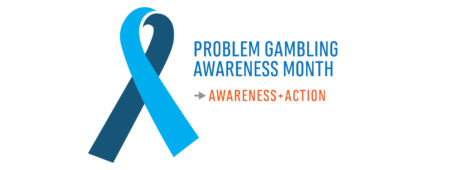Massachusetts Gaming Commission recognizes March 2020 as Problem Gambling Awareness Month
- February 27, 2020
- by MGC Communications
- 0 comments

Did you know that the Massachusetts prevalence rate of problem gambling is approximately 2 percent of the adult population? A study conducted as part of the Massachusetts Gaming Commission’s robust research agenda further indicated an additional 8 percent of the state’s population is considered at-risk gamblers, and about 1 in 5 Massachusetts adults reported knowing someone who they considered gambling too much.
The Massachusetts Gaming Commission (MGC) recognizes March 2020 as Problem Gambling Awareness Month (PGAM). Established 16 years ago, PGAM is a national outreach campaign designed to educate the public about problem gambling and the resources available.
In recognition of a statewide commitment to increasing awareness, Massachusetts Governor Charles D. Baker and Lieutenant Governor Karyn Polito have officially declared March as Problem Gambling Awareness Month across the Commonwealth, “urging citizens to take cognizance of this event and participate fittingly in its observance, ” according to the proclamation.
MGC Chair Cathy Judd-Stein said, “On behalf of my fellow commissioners, I’d like to thank Governor Baker and Lt. Governor Polito for supporting this meaningful opportunity to come together and raise awareness about problem gambling and highlight the many resources available. Promoting healthy play and reducing gambling-related harm is a primary focus of the Commission’s work, not only during this important month of advocacy but throughout the year.” Chair Judd-Stein added, “We commend the collaboration and commitment from our many partners and stakeholders who perform a vital role in providing the education and programs necessary to support those in need.”
This year’s PGAM theme of “Awareness + Action” aims to generate awareness about the risks of gambling and urges action toward hope and recovery for those in need.
In honor of PGAM 2020, MGC presents the following new initiatives and activities covering four key areas of focus, including:
EDUCATION & OUTREACH: The MGC encourages casino employees and patrons to engage with its responsible gaming program, GameSense. The MGC works closely with the Massachusetts Council on Compulsive Gambling (MCCG) and GameSense advisors to promote this month of advocacy by hosting a series of educational activities for casino employees and patrons at each casino property.
Throughout the month, the MGC will also implement an enhanced paid advertising, marketing and digital campaign to educate the public about GameSense and highlight the availability of the Voluntary Self-Exclusion program, among other tools and resources.
PREVENTION: The MGC supports the ongoing implementation of strategies aimed at preventing and minimizing gambling-related harm. PGAM offers a valuable opportunity to highlight prevention-related initiatives, including the upcoming expansion of the innovative budgeting tool, PlayMyWay, to MGM Springfield and Encore Boston Harbor.
RESEARCH: The MGC is advancing its groundbreaking research agenda to further understand the true social and economic effects of Massachusetts casinos, with a particular focus on gambling behaviors and especially at-risk and problem gambling.
In March, the MGC will unveil an exciting new online research hub, offering easier access to its robust gaming research library. As part of that effort, the MGC will launch its first-ever open data exchange, providing researchers from around the world with access to many of the datasets generated through its research agenda. This effort demonstrates an unprecedented commitment to advancing science on gambling-related issues.
COLLABORATION & SUPPORT: The MGC supports Cambridge Health Alliance’s ‘Gambling Disorder Screening Day,’ taking place on March 10, 2020. On the same day, GameSense advisors will offer problem gambling screening to the staff at Plainridge Park Casino, MGM Springfield and Encore Boston Harbor.
Mark Vander Linden, MGC’s Director of Research and Responsible Gaming, said, “We recognize that problem gambling causes tremendous pain and suffering to individuals, their families, and communities. Our goal in Massachusetts is clear: work closely with our partners to mobilize an evidence-informed comprehensive strategy to reduce the harm caused by gambling to the maximum extent possible.”
Marlene Warner, Executive Director of the Mass. Council on Compulsive Gambling, said, “Across the Commonwealth, we’ll hold briefings, host screening and training days, run media campaigns, and conduct awareness initiatives to reach people who can make a difference in ensuring that problem gambling services are widely available and accessible.”
More information on MGC’s problem gambling prevention efforts is available at MassGaming.com.
If you or someone you know needs immediate help with a potential gambling problem, please visit the Massachusetts Council on Compulsive Gambling website or call the helpline at 1.800.426.1234.
About MassGaming
The mission of the Massachusetts Gaming Commission is to create a fair, transparent, and participatory process for implementing the expanded gaming law passed by the Legislature and signed by the Governor in November 2011. In creating that process, the Commission will strive to ensure that its decision-making and regulatory systems engender the confidence of the public and participants, and that they provide the greatest possible economic development benefits and revenues to the people of the Commonwealth, reduce to the maximum extent possible the potentially negative or unintended consequences of the new legislation, and allow an appropriate return on investment for gaming providers that assures the operation of casino-resorts of the highest quality. For more information on MGC, please visit MassGaming.com or connect and share on Twitter (@MassGamingComm) or Facebook www.facebook.com/MAGamingComm.